Humble vegetables like broccoli and cauliflower often get pushed to the side in favor of the latest superfood, but you might be surprised at the impressive array of health benefits these cruciferous vegetables have.
Cultivated since as early as 4000-5000 BC, cruciferous veggies actually have an impressive history. Not only have they been a dietary staple for many different civilizations, they’ve also been used medicinally throughout the years.
Believe it or not, cabbage was considered a powerful remedy in 16th century Europe for a variety of ailments. Other related vegetables were used for everything from snake bites to heart pain.
And while you might not want to reach for Brussels sprouts after a venomous snake encounter, cruciferous vegetables have been proven by modern research to be incredibly good for you in other ways — as you’ll soon see.
What Are Cruciferous Vegetables?

Cruciferous vegetables belong to a large family of related plants known as Brassicaceae.
An older and less used name for this plant family is Cruciferae, which is where these specific vegetables get their name. The Latin word ‘Cruciferae’ translates as “cross-bearing” and refers to how the flowers of all the plants in this family have a cross-like appearance.
Originally native to parts of Europe, Asia, and the Mediterranean, cruciferous vegetables are now grown all around the world, and many regions have their favored type. They are one of the most common food crops by far.
Sometimes, you’ll see ‘cruciferous’ used interchangeably with ‘brassicas’, even though the two aren’t technically the same.
Many of the most popular cruciferous vegetables (like broccoli and cauliflower) do come from the botanical genus Brassica. However, several others don’t. Arugula, for example, comes from the genus Eruca, and radishes from the genus Raphanus.
Or if you want the short version: All brassicas are cruciferous vegetables, but not all cruciferous vegetables are brassicas.
List of Cruciferous Vegetables
In order to get the health benefits of cruciferous vegetables, you need to know which ones belong to this category. Many are familiar, but some options might surprise you.
Here are the most popular and readily available:
- Broccoli
- Cauliflower
- Brussels Sprouts
- Cabbage
- Kale
- Arugula
- Radishes
- Daikon
- Bok Choy
- Tatsoi
- Collard Greens
- Rutabaga
- Turnip
- Maca (the adaptogenic herb/superfood)
- Kohlrabi
- Mustard Greens
- Mizuna
- Horseradish
- Watercress
- Wasabi
As you can see, there are quite a few cruciferous vegetables to choose from, so you won’t be stuck eating the same few all the time. And while they do each have a unique nutritional profile, all of them share some distinct benefits.
Top Benefits of Cruciferous Vegetables
Rich in Health-Boosting Nutrients
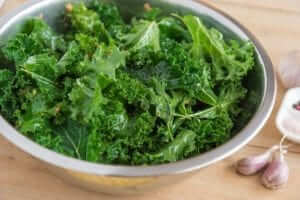
As mentioned, each cruciferous vegetable will have a slightly different nutrient makeup but all contain essential vitamins and minerals.
This group as a whole tends to be especially high in vitamins A, C, and K as well as minerals like magnesium, potassium, calcium, iron, and selenium. Many are also high in folate (vitamin B-9), vitamin B-6, and vitamin B-2.
All of these nutrients will give your body a health boost.
Eating lots of vitamin C foods is vital for keeping your immune system strong. There are also many benefits of vitamin C for your skin, including slowing the aging process.
Vitamin A is incredibly important for eye health and has skin-boosting benefits as well. Vitamin K is an essential nutrient for proper blood clotting and also a little known contributor to bone health. (It’s critical to have vitamin K alongside calcium and vitamin D to prevent bone weakness.)
Magnesium is an especially important mineral to get more of in your diet because many people are deficient. It plays a big role in central functions like sleep, mood, muscle health, metabolism, and brain function.
Folate is a little discussed nutrient that is needed for basic cellular function. It has a role in DNA and RNA formation and is needed for red blood cell formation alongside iron and vitamin B-12.
Rich in Fiber for Better Gut Health
Along with essential nutrients, cruciferous vegetable are also full of dietary fiber.
Many of them contain 3-5 grams of fiber per one cup serving. The current recommended daily intake (RDI) for fiber is between 25-30 grams, so you can get between 10-20% of the RDI with just one serving of something like broccoli.
Cruciferous vegetables contain both soluble and insoluble fiber, which each have their own health benefits.
Soluble is the type of fiber that dissolves and creates a gel as it’s digested. It helps to control blood sugar levels and improves digestion.
Insoluble fiber does not get dissolved, but it does pull in water as it travels through your digestive tract. This helps waste pass more quickly through your body and helps prevent constipation.
Dietary fiber also acts as a prebiotic to feed beneficial bacteria in your gut, which is good news for your overall digestion.
High in Free Radical Fighting Antioxidants
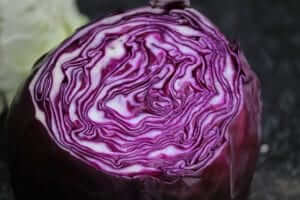
Cruciferous vegetables can be considered an anti-aging food group because they contain antioxidants that help protect your body from free radical damage and oxidative stress.
The main antioxidants found in this vegetable group are polyphenols, carotenoids, and vitamin C. Again, the type and amount of antioxidants will vary somewhat in each specific vegetable but all are important for lowering your risk of chronic diseases associated with free radicals.
One especially beneficial antioxidant is quercetin.
It’s be found abundantly in cruciferous vegetables including broccoli, cabbage, Brussels sprouts, and kale. Quercetin has many proven benefits and can help to lower chronic inflammation, combat seasonal allergies, and boost skin health.
High in Plant Compounds with Anticancer Potential
One of the major health benefits of cruciferous vegetables is their potential cancer-fighting power. Several plant compounds from this veggie family have documented anticancer properties that may slow tumor growth and provide protection against cancer.
Glucosinolates are the compounds responsible for giving cruciferous plants their distinct, somewhat bitter flavor. They have antioxidant and anti-inflammatory activity and have shown anticancer action in research studies.
Sulforaphane is another important compound that has been shown to stimulate enzymes that help detoxify your body of carcinogens and to protect DNA from mutations that may cause cancer.
Indole-3-carbinol and crambene are two more compounds found in cruciferous vegetables that activate the carcinogen-detoxifying enzymes. Interestingly, the two work more powerfully together than on their own.
To add to this, studies show an association between eating more cruciferous vegetables and a lower cancer risk. This seems to be especially noticeable for lung, stomach, colon, and rectal cancer. (It’s also important to note that this was for cruciferous vegetables specifically, not just a higher intake of vegetables in general.)
Helps Reduce Chronic Inflammation
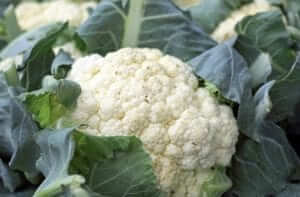
As a rich source of antioxidants and other plants compound with anti-inflammatory properties, cruciferous vegetables are a key food for lowering chronic inflammation.
More and more research is suggesting that constant, low-level inflammation is behind many chronic conditions. This includes cancer, autoimmune disorders, heart disease, and more.
Many factors fuel inflammation within your body: stress, free radical damage, toxins, a highly processed diet, etc. It’s impossible to get away from all sources of inflammation, so consuming inflammation-lowering foods (and herbs like turmeric) is therefore vital for health.
In studies, there is a strong correlation between a higher intake of cruciferous vegetables and lower inflammatory markers. Yet another good reason to add them to or keep them in your diet!
Provides a Boost to Your Immune System
Some of the same compounds that give cruciferous vegetables anticancer health benefits can also help immune health.
Indoles and isothiocyanates are two compounds that form when glucosinolates get broken down. (This happens during food prep, chewing, and digestion.) Not only do they help protect your cells from DNA damage, they also have antiviral and antibacterial properties.
Upping your intake of cruciferous vegetables makes more of these antimicrobial compounds available to your body. This, in turn, can boost your immune defenses and help ward of infection.
May Help Balance Estrogen Levels

Hormone imbalance is unfortunately a common occurrence these days. Endocrine disruptors are a large part of the problem, including foreign chemicals that can mimic estrogen in the body (called xenoestrogens).
Estrogen imbalance is especially problematic for women because it’s a main regulator of the female reproductive system. Too much or too little can cause severe menstrual problems, headaches, and more.
Indole-3-carbinol, one of the anticancer compounds in cruciferous vegetables, has shown an ability to help regulate both estrogen activity and metabolism. It seems to have the most effect on high estrogen levels.
Because of this, eating more cruciferous vegetables is one way to help bring estrogen back in balance. Of course, getting rid of endocrine disruptors is also important as is lowering stress.
Promotes and Protects Heart Health
All of the powerful antioxidants and anti-inflammatory compounds found in cruciferous vegetables are good news for your heart. This is because oxidative stress and chronic inflammation both play a role in the development of heart disease.
In fact, adding more of any type of vegetable to your diet is great for heart health. Loading up on them (and fruit) can lower your risk of high blood pressure, obesity, and type 2 diabetes- all risk factors for heart disease.
However, cruciferous vegetables do seem to have specific (though still unknown) health benefits for your heart. Some research has documented that cruciferous vegetable intake has a stronger association with reduced risk of death from heart disease than general vegetable consumption does.
Not bad for a family of humble vegetables!
Contain Omega-3s for Brain Health

Usually associated with fish, you may be surprised to learn that cruciferous vegetables can also be a good source of omega-3 fatty acids.
Omega 3s have many benefits, but one of their most notable is the protection of brain health. They have the potential to reduce the risk of diseases like Alzheimer’s and dementia and may also help protect you from age-related cognitive decline.
Brussels sprouts are at the top of the list for omega-3 content, closely followed by broccoli.
The only “downside” to getting omega-3s from cruciferous vegetables is that they contain a form known as ALA. It must be converted to the more active forms of DHA and EPA in your body. This process is very inefficient, so you’ll need to consume a lot of ALA to get enough active omega-3.
Potential Weight Loss Aid
Because of their excellent fiber content, cruciferous vegetables help to promote healthy weight loss. Fiber makes you feel fuller for longer and can also reduce cravings for not so healthy foods. This adds up to a better chance of losing weight and body fat.
One study also found that eating non-starchy vegetables (like cruciferous ones) gives you a better chance of losing weight than loading up on starchy veggies.
Can Cruciferous Vegetables Cause Thyroid Problems?
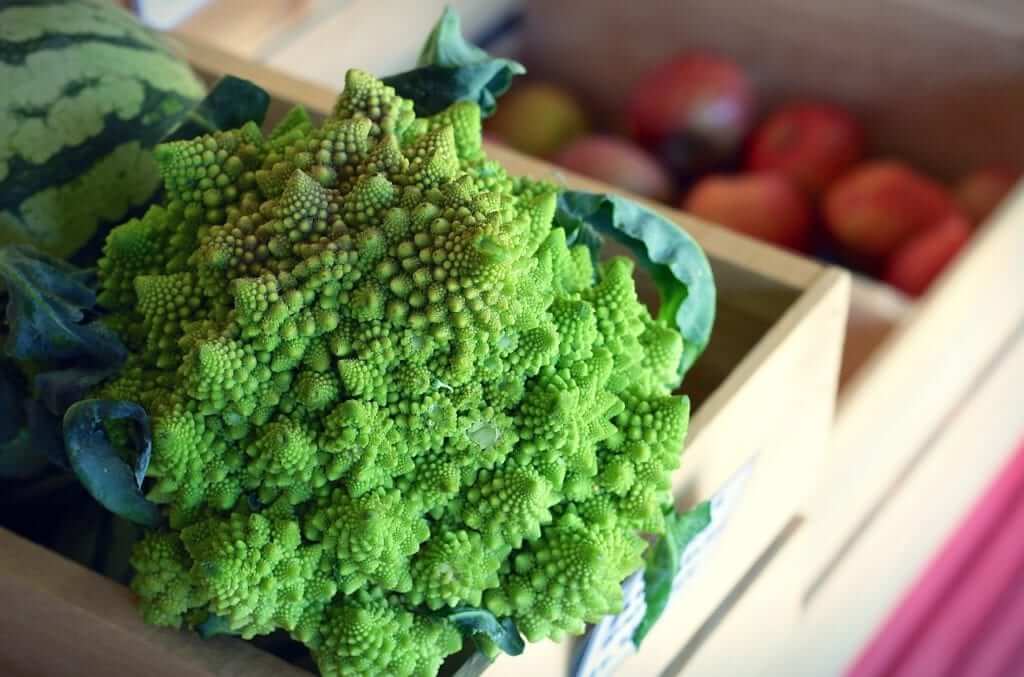
Some people hesitate when it comes to getting health benefits from cruciferous vegetables because of reports that they can cause thyroid problems. This comes from some research showing that eating this particular type of vegetable raw leads to the release of goitrogens, compounds that can cause thyroid dysfunction.
However, experts consistently point out that the amount of cruciferous vegetables needed to actually impact your thyroid is much larger than anyone could realistically eat. Those who already have a thyroid disorder are advised to eat cruciferous vegetables in moderation and consume them cooked more often than raw.
Digesting Cruciferous Vegetables More Easily
One of the true downsides of cruciferous vegetables is that they can be hard on the digestion, especially when eaten raw. This is partly from their high fiber content and partly from the presence of a complex sugar (raffinose) that human digestive tracts can’t break down.
If you’ve experienced this trouble for yourself, a good start is to consume these veggies cooked rather than raw.
More specifically, try steaming broccoli and similar vegetables. This has been found in research studies to be the best method for activating cancer-fighting glucosinolates AND for breaking down the fiber for better digestion.
A Win for “Common” Vegetables
Now that you know how many incredible health benefits of cruciferous vegetables there are, you might want to pay more attention to these humble veggies! Not to be outdone by exotic superfoods, these vegetables are packed with nutrients that can fight cancer, protect heart health, reduce inflammation, and much more.
Don’t hesitate to load up on broccoli and find a new recipe for roasting Brussels sprouts. These vegetables have been a health-boosting staple for hundreds of years, and it’s time they were “rediscovered”.
NEXT UP: Top Recommended BrocElite Supplement
If you would like to eat more cruciferous vegetables but have problems digesting them (or don’t like the taste), consider adding a high quality supplement like BrocElite to your diet.
BrocElite is a unique supplement I take personally that contains a highly bioavailable form of sulforaphane derived from non-GMO broccoli seeds. Sulforaphane is the powerful compound in cruciferous vegetables that provides powerful support for a healthy immune system and healthy inflammation levels, and it can help the body detox carcinogens, among other benefits.
BrocElite contains pure sulforaphane (no fillers) without the fiber of broccoli that can cause digestive difficulties. It’s a great way to boost your intake of this health-boosting compound.
CLICK HERE NOW to Find Out More on How BrocElite Can Help You
(NOTE: You’ll also see they have a special opportunity available on it today if you are interested!)



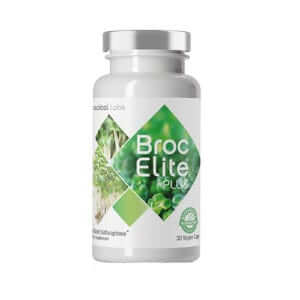
Thank you for all your very educational re searches
I am learning so much
May the Lord bless all you do
Heidi
GREAT REPORT, THIS SHOULD BE TAUGHT IN HEALTH CLASSES AND SERVED IN SCHOOL LUNCHES. [ AM A HEALTH NUT OVER 84 YEARS OLD. THANK YOU
I love this article, so informative! My family is eating a plant that combats inflammatory responses. It is called Murdannia Loriformis. We grow it and have been eating it for years. My wife and I enjoy a very healthy life, I think this plant has a lot to do with it. Anybody familiar with this plant?
Thank you so much! I find it all so fascinating, I suck it in like a sponge! 🙂
Dear Brian,
Thank you for this valuable information.
Kindest regards
John
Your article is excellent, very thorough, and clearly written.
Thank you for pulling all of this helpful information together so succinctly!
Great article, will be going back to as reference/refresher. Love the photo shoot of the flirtatious radish! Have a great weekend
Thank You Brian, Another priceless and well presented article .
This was very informative. I am a vegetarian and eat lots of broccoli, brussel sprouts and cauliflower. Now I have others to add to the list. Thank you very much Brian.
For Jon Jew. I am very interested in finding out more about the plant you mentioned. Murdannia Loriformis. Can it be grown in Queensland. Australia?? Or is there something similar here?? Thank you. Jan B